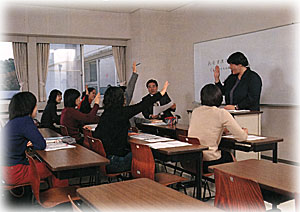Faculty of Integrated Arts and Social Sciences
As the twenty-first century approaches, we find ourselves in a time of
great social upheavals. The world is beset with problems of a global scale, and
the purpose and direction of sci-ence are being questioned. Japan's society has not been immune to these
changes: the country is now undergoing a massive shift toward increasing tech-nological
sophistication, computerization, globalization, and the aging of society.
The Faculty of Integrated Arts and Social Sciences was established in 1990 at
the Nishi-Ikuta campus to encourage among today's students a deeper examination of what
constitutes a humane society, to help them to distinguish between what must be changed and
what must not, and to allow them to develop the ability to take charge in the building of
a warmer, more humane society. This faculty, which can be seen as a direct extension of
the educational ideas of the University's founder, Jinzo Naruse, was established by
reorganizing existing departments and adding new ones. Its goal is to nurture individuals
who will draw on the strengths inherent in women to become leaders of the twenty-first
century.
In accordance with this mandate, the Faculty of Integrated Arts and Social
Sciences is not merely an amalgamation of the humanities and social sciences. Covering
five disciplines-contemporary sociology, social welfare, education, psychology, humanities
and cultural studies-its raison d'etre lies in transcending the borders of academic
disciplines to question the purpose and direction of society, never neglecting the inner
pursuit of the question, "What is humanity?"
The Faculty of Integrated Arts and Social Sciences is unique in several ways.
Firstly, the Faculty strives to instill in students a comprehensive awareness
and understanding of the humanities and social sciences. All students follow general
introductory courses as well as specialist courses in their own departments. Departmental
courses include broad integrated overviews of their own and related disciplines taught by
the most senior staff of each department. Students also follow a further two courses that
they choose from a special list of courses offered by other departments in the Faculty.
These requirements ensure that the students' education does not become overly specialized.
Second, the Faculty's curriculum is designed to promote the discovery,
recognition and solving of social problems among students. Students of this faculty should
take the initiative in uncovering problem areas, deepening their awareness of these
issues, and working to find solutions to these issues through research in their fields of
specialization. As a result, all of the departments in this Faculty assign great
importance to laboratory and hands-on learning and field work.
The third characteristic of the Faculty is its diverse faculty. The recruitment
of women professors is encouraged in each department, and academics are also invited from
countries such as the United Kingdom, France, Sweden, Austria, Canada and China.
Fourth and finally, the Faculty aspires to the ideal of an open university. Returning
adult students and international students are welcomed, and the Faculty strives to attract
students not only from the affiliated senior high school but from a wide range of other
high schools as well. It also sponsors lectures that are open to the local public.
